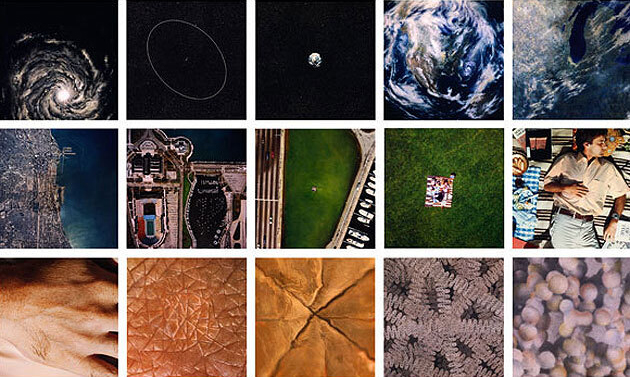
Charles and Ray Eames, Film stills from Powers of Ten, 1977.
You are alone in your studio. You have to find a place to begin whatever it is you are beginning. The metaphor of the ominous blank canvas is everywhere, ready for launch, which can only come from you. There will be input from other sources, not all of it helpful. There will be complexity and confusion, deviations and traps. There will be missteps and accidents, demons and discovery, but none of this will reveal itself unless you dive in, and dive in deep.
You take a breath, and start again. Only this time, gentle with yourself, patient with your mind, open to the world, you know what you have to do. The input comes in like the tsunami it is: good cops and bad cops, tossing you here and there. It’s work, after all, to make it through to the other side. And the only thing that matters here is that you do.
None of it easy. All of it necessary. And you are the balancing act, navigating it all.
Ralph Waldo Emerson wrote with great compassion about emotional recovery and resilience, about how bended trees recover in strong winds. A humanist by training and a naturalist by choice, he looked for patterns in things, mindfully observing the many ways the world revealed itself, and how that might teach us something about ourselves.
As a theorist, he was a chameleon. Prickly, but principled, he could be hyperbolically critical one moment, stunningly compassionate the next. But this was the work at hand: to look at the micro as well the macro, the uniqueness of the individual against the universality of the human condition.
Somewhere in between lay the act of discernment: part strategy, part sentiment, the work of the self.
Discernment can reveal itself in matters of taste, questions of worth, issues of value, even expressions of hierarchy. It can be moral or psychological, perceptual or liturgical. But mostly it is personal: a solo practice: you discern by yourself, for yourself.
Yet at the opposite end (and there is always an opposite end) this process invites you to consider bigger, more universal ideals, spiritual and immeasurable truths, which may explain why Emerson turned, as he often did, to the poetic.
Poetry was rhapsodic, but it was also a form of subterfuge: it offered a convenient place to reconcile his unanswerable thoughts. Emerson, being a man of privilege and pride, likely hid behind poetry to say what he, himself could not.
And here, he was not alone.
Poets, wrote Hannah Arendt, are the only people to whom love is not only a crucial, but an indispensable experience, which entitles them to mistake it for a universal one.
Because it really is all about love, is it not?
Discerning is a practice, a process, but it is also a virtue. It requires focus and wonder, humility and bravery, a firm embrace of the universal with the unique. It takes work to see what is not yet in focus, to be who you truly are. Approach your practice with an open mind and a generous heart. Remember that losing yourself in your work means finding yourself in it, too. And delight in the idea that sometimes, as the poet Jack Gilbert so beautifully said, you have to unlearn the constellations to see the stars. The blank canvas is only the beginning, and beginnings, it must be said, are all about promise. You have always been ready for that.
The Self-Reliance Project is a daily essay about what it means to be a maker during a pandemic. Sign up to get it delivered to your inbox here.
